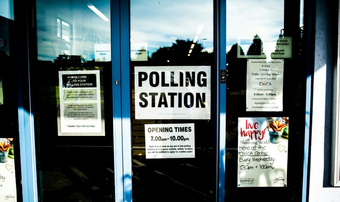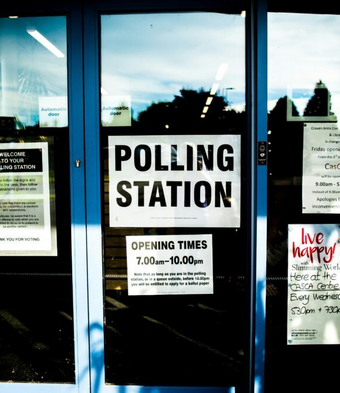Learning points from the US election

What a week it has been. Seven days ago, many were predicting that we might still be waiting now for the result of the US election. As it turned out, the result became clear pretty quickly, with key battleground states falling for President Trump by the early hours of Wednesday morning.
Countless hours of broadcast and pages of print have and will continue to be expended on analysing the result, with many on both sides of the Atlantic perplexed and dismayed at how Donald Trump has won.
Before adding my own perspective, let me first state that I do not think there was a “good” choice for Christians in this US election.
Some might argue that that is almost always the case, but I feel that this time it was particularly true. It poses a challenge for us – not to disengage but to grapple with the hard choices of a fallen world and to seek God’s heart and priorities. We do that from His word, through prayer, and by being open to how He can prompt and challenge our preconceptions and biases in so many ways. Christians must faithfully engage, understanding that politics can never be our source of our salvation or our identity, but can be the means to restrain evil and to do what is good.
The choice not to choose?
Our house has followed this election campaign more closely than many in the UK. My wife is from Boston (Massachusetts, not Lincolnshire!) and avidly monitors US politics and news. I have seen her become increasing dismayed, frustrated, and fearful about the choice of President and the division it has caused.
She grappled with how to vote, and for the first time considered not voting at all. I reminded her of the advice from Charles Spurgeon, who once said, “of two evils, do neither.” However, neither my wife or I were convinced that this was satisfactory, and I can confirm that she did cast her vote several weeks ago!
But I sense that her difficulty was mirrored by millions in the US, and with that in mind, I found a US friend’s post from election night on Facebook very helpful, and a path, I hope, to reconciliation in a divided nation.
My friend is not a well-known public figure and so I will not name him here. In prefacing his post, he warned that his words might be a trigger for some. That may still be the case in my requoting him now. If that is so, it is not my intention. Rather, I pray it will help foster the repair of relationships, and grow understanding and grace:
“I believe Donald Trump is toxic and will do damage to our democracy and bring harm to some of our most vulnerable neighbours. I cannot in good conscience vote for him.
Also, people I love will vote for him. I understand some of the reasons they are. I’ll still love them.
I believe Kamala Harris is misguided in some of the most essential elements of our humanity and design for human flourishing. I believe this will do harm to the unborn and to our social fabric. I cannot in good conscience vote for her.
Also, people I love will vote for her. I understand some of the reasons they are. I’ll still love them.
(As much as I would love to chose between truth and love, as I understand them, Jesus won’t let me.)”
I feel the pain of his words in the choice many Americans faced at this election.
With the advantages and disadvantages of an outsider – a Brit observing from a distance, albeit with a particular perspective, given the nationality of my wife – let me offer some observations on lessons to be learnt for the future.
Lessons for the Democrats
First, although I am certain that some will have decided not to vote for Kamala Harris because she is a woman, and/or because she is not white, if the Democrats reduce her loss to this, they are gravely mistaken. I do not believe these were key and primary drivers for most Americans.
Second, the Trump campaign prioritised the majority’s priorities. Safety and financial well-being were the key issues for most voters. Donald Trump successfully got people to focus on whether they were better off after four years of the Biden presidency, and most, with concerns about inflation and job security said no. Immigration, for many, is an issue of security and sustainability, not overt racism. Much of what President Trump has stated concerning immigration is false and stokes dangerous sentiment – but people felt he was the only candidate willing to address real concerns.
Third, a campaign based on the threat to democracy and character does not ‘trump’ more fundamental concerns about living standards. This may be partly because of American’s unwavering faith in their constitution being able to keep any one individual’s undemocratic ambitions in check, or because they simply believed Trump’s words were ‘campaign hyperbole’. Neither was this the referendum on abortion that some wanted it to be. It is clearly important to many but only the most important issue for some.
Fourth, it is not just that many feel Donald Trump speaks into their priorities but that he is a voice for many who feel disenfranchised. In a recent US TV network analysis of the election, the point was made that many of those in positions of power – not just in politics, but culture-influencers in the media, business and other walks of life – look down at, or ignore, ‘middle’, blue-collar America.
It seems that over the course of the last two decades the US Democratic Party has transitioned from being the party of blue-collar workers to the party of university graduates. This has left a perception that they care less about meeting the needs of working-class communities and more about lecturing them to be more socially progressive. I am personally unconvinced that elements of the Republican leadership are any less privileged or more in touch with these communities than their Democratic counterparts, but many felt that the Democrats were further away from their lives.
Lessons for the UK
There is much more which could be said in understanding the events of Tuesday night, but even from these alone, there is much which our politicians (and indeed the church) can learn from.
Within politics, I wonder if, on Wednesday morning Keir Starmer felt vindicated for the reforms he has carried out within the Labour Party?
Labour could have gone down the route of the US Democratic Party and been disproportionately influenced by extreme voices. It certainly pursued this path for many years before the Prime Minister’s election as Labour leader. In the two years before the election Kier Starmer led his party away from several harmfully radical positions, and focused instead on matters that matter to people – health, wealth, safety – and adopted more conservative and realistic positions on many social issues.
That is not to suggest that I agree with all that the Labour Party currently stands for, but there is a clear difference between what Labour and Democrats prioritised in their respective election campaigns. There is also a lesson for the current Government in its pursual of social reforms such as assisted suicide - directly or by proxy – that will not only be harmful, but will be seen as a distraction from what people felt they were voting for.
There is an irony here. Political parties and politicians often say they are representing various constituencies of people. Yet how much do they really listen? They talk about respecting the electorate, but do they really respect the fundamental human dignity of every person?
When those like Barack Obama suggested that black men who did not vote for Kamala Harris were sexist, he was ignoring their views on family and work. Political leaders and parties can disagree with the views of particular communities, but they still need to respect and seek to understand them. Both the main parties in the US would do well to listen to the black and Latino church and respect all their views. The same can be said in the UK where politicians often like to cherry-pick parts of the Church’s teaching that endorse their own views rather than be open to be challenged by the radical message of God’s word.
How should the church respond to this?
This begins to suggest lessons that the Church and Christians can learn from all our elections this year.
We need to present to the main political parties the high view of every person that is at the heart of our faith. Christians believe that every individual is made in God’s image, and we should always be inquisitive to know, understand and seek the flourishing of our neighbours. Not for our own ends but for theirs. We should be the most inquisitive, people fascinated to understand our neighbours.
And we should be confident that God has a better story for them, and for the society we live in. So, we need to be confident in offering our hope to others – not only proclaiming the gospel but in demonstrating how God’s plan for our good life together now, in this broken, sin-infused world, is better than any alternative. His word gives us the wisdom to speak into economics, healthcare, education, work, international relations, and immigration.
God’s heart is not to Make America Great Again, it is to make all image-bearers great again, by becoming His sons and daughters and living in healed relationship with him. He wants us to follow His good provision for Creation and our life in it together. God wants us to flourish. Yet too often, politicians play on my desire to seek my own short-term wellbeing, and to not follow the command to love my neighbour before myself. My words and actions too often incentivise politicians to appeal to my pride and my own desires and wants, not to how they will serve and protect today’s widow, orphan, poor and foreigner.
God’s word also reminds us that policies are important but so to is character. Proverbs 31 describes the king who is righteous in God’s eyes. At the heart of our own discipleship is the desire to become more like our saviour, and we should elevate and seek to promote Christ-like character in public life. It seems to me that there is little of Jesus’ character visible in Donald Trump’s personality, but we should be equally realistic and honest about our other political figures as well.
I cannot provide a neat equation concerning the balance between character and policy in guiding how Christians should vote. Much depends on particular policies and the type of character in question. All I will suggest, is that as I get older, character has become more and more important in my own decision-making, because out of character flows a person’s long-term policy positions, as well as their reactions to events no-one can predict at election time.
How do we encourage good character in our public square and support faithful Christians in politics to stand true? We need to show grace and compassion, but also to love truth.
We do this at CARE by seeking to be authentic faithful friends to politicians and others in the public square. We encourage and faithfully pray for them, but also humbly challenge and resist where appropriate, while still holding them in relationship. We are also investing in the next generation of Christians in public leadership, so that they will become people with deep roots in God’s word, leaders of substance and character. And each of us can do this at a local level. We have the privilege of living in a democracy. That is a privilege of the time and place we live in.
Whether we see the result of the US election as something to mourn or something to celebrate let us not forget or neglect the privilege we have been given: to promote the better story and the better way we can offer to our neighbours and to our politicians.






